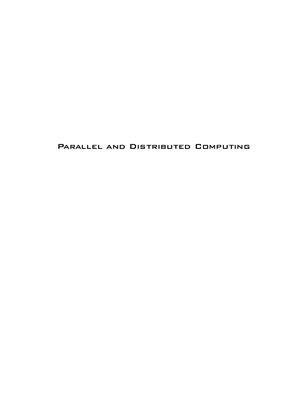Издательство InTech, 2010, -298 pp.
Parallel and distributed computing has offered the opportunity of solving a wide range of computationally intensive problems by increasing the computing power of sequential computers. Although important improvements have been achieved in this field in the last 30 years, there are still many unresolved issues. These issues arise from several broad areas, such as the design of parallel systems and scalable interconnects, the efficient distribution of processing tasks, or the development of parallel algorithms.
This book provides some very interesting and highquality articles aimed at studying the state of the art and addressing current issues in parallel processing and/or distributed computing. The 14 chapters presented in this book cover a wide variety of representative works ranging from hardware design to application development. Particularly, the topics that are addressed are programmable and reconfigurable devices and systems, dependability of GPUs (General Purpose Units), network topologies, cache coherence protocols, resource allocation, scheduling algorithms, peertopeer networks, largescale network simulation, and parallel routines and algorithms. In this way, the articles included in this book constitute an excellent reference for engineers and researchers who have particular interests in each of these topics in parallel and distributed computing.
Fault tolerance of programmable devices
Fragmentation management for HW multitasking in 2D Reconfigurable Devices: Metrics and Defragmentation Heuristics
TOTAL ECLIPSE—An Efficient Architectural Realization of the Parallel Random Access Machine
Facts, Issues and Questions - GPUs for Dependability
Shuffle-Exchange Mesh Topology for Networks-on-Chip
Cache Coherence Protocols for Many-Core CMPs
Using hardware resource allocation to balance HPC applications
A Fixed-Priority Scheduling Algorithm for Multiprocessor Real-Time Systems
Plagued by Work: Using Immunity to Manage the Largest Computational Collectives
Scheduling of Divisible Loads on Heterogeneous Distributed Systems
On the Role of Helper Peers in P2P Networks
Parallel and Distributed Immersive Real-Time Simulation of Large-Scale Networks
A parallel simulated annealing algorithm 4pt as a tool for fitness landscapes exploration
Fine-Grained Parallel Genomic Sequence Comparison
Parallel and distributed computing has offered the opportunity of solving a wide range of computationally intensive problems by increasing the computing power of sequential computers. Although important improvements have been achieved in this field in the last 30 years, there are still many unresolved issues. These issues arise from several broad areas, such as the design of parallel systems and scalable interconnects, the efficient distribution of processing tasks, or the development of parallel algorithms.
This book provides some very interesting and highquality articles aimed at studying the state of the art and addressing current issues in parallel processing and/or distributed computing. The 14 chapters presented in this book cover a wide variety of representative works ranging from hardware design to application development. Particularly, the topics that are addressed are programmable and reconfigurable devices and systems, dependability of GPUs (General Purpose Units), network topologies, cache coherence protocols, resource allocation, scheduling algorithms, peertopeer networks, largescale network simulation, and parallel routines and algorithms. In this way, the articles included in this book constitute an excellent reference for engineers and researchers who have particular interests in each of these topics in parallel and distributed computing.
Fault tolerance of programmable devices
Fragmentation management for HW multitasking in 2D Reconfigurable Devices: Metrics and Defragmentation Heuristics
TOTAL ECLIPSE—An Efficient Architectural Realization of the Parallel Random Access Machine
Facts, Issues and Questions - GPUs for Dependability
Shuffle-Exchange Mesh Topology for Networks-on-Chip
Cache Coherence Protocols for Many-Core CMPs
Using hardware resource allocation to balance HPC applications
A Fixed-Priority Scheduling Algorithm for Multiprocessor Real-Time Systems
Plagued by Work: Using Immunity to Manage the Largest Computational Collectives
Scheduling of Divisible Loads on Heterogeneous Distributed Systems
On the Role of Helper Peers in P2P Networks
Parallel and Distributed Immersive Real-Time Simulation of Large-Scale Networks
A parallel simulated annealing algorithm 4pt as a tool for fitness landscapes exploration
Fine-Grained Parallel Genomic Sequence Comparison

